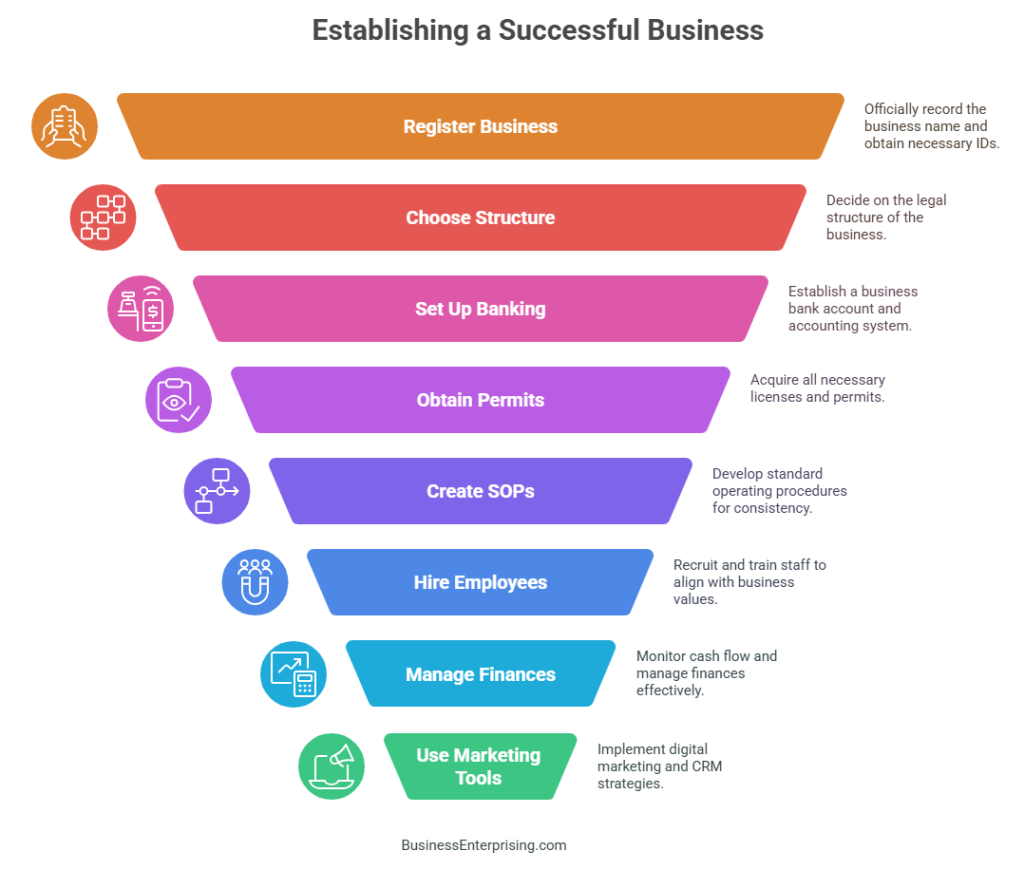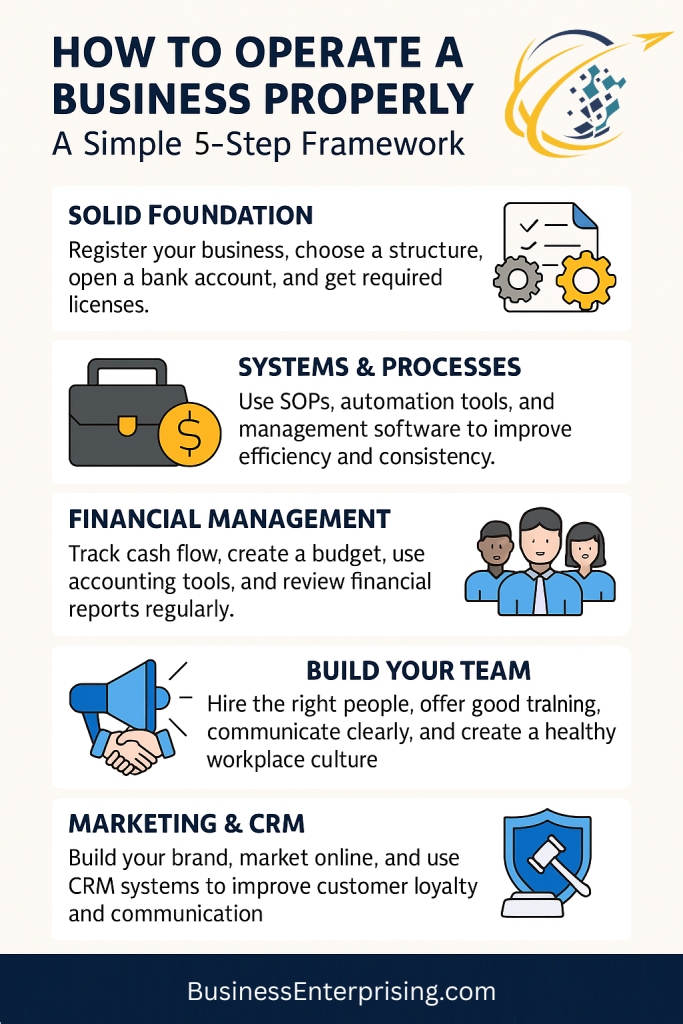 Running a business takes more than a great idea. You also need clear direction and structure. Knowing how to operate a business properly helps you build stability and avoid costly mistakes. Many owners focus on growth but overlook the details that support long-term success. However, those details are often what make the biggest difference.
Running a business takes more than a great idea. You also need clear direction and structure. Knowing how to operate a business properly helps you build stability and avoid costly mistakes. Many owners focus on growth but overlook the details that support long-term success. However, those details are often what make the biggest difference.
Additionally, you should understand how every part of your business connects. Your systems, people, finances, and customer relationships must work together. If one part falls behind, it can affect the rest. Therefore, planning ahead and staying organized helps you avoid problems before they grow.
However, no one starts with everything figured out. You’ll learn by doing, adjusting, and solving problems along the way. That’s why a strong foundation matters. It gives you a base to build on as your business changes. You don’t need to rush, but you do need to pay attention.
Moreover, having the right tools and habits in place supports your daily operations. From hiring to budgeting, each decision shapes your future. So, take time to focus on what works and what doesn’t. Small changes today can lead to better results tomorrow.
Your business won’t run itself. It needs your time, your input, and your leadership. With the right structure, you’ll feel more in control and less overwhelmed. Each step you take toward better operations brings more clarity and confidence. If you stay focused, you’ll build something that lasts.
Establishing a Solid Business Foundation
Running a business begins with a strong foundation. First, register your business with the proper government agency in your state. This step gives your company legal status and allows you to operate officially. You should also decide on a business structure early. For many, an LLC offers flexibility and liability protection. Others may prefer a corporation for its ability to raise capital. Your choice affects taxes, operations, and personal liability.
Additionally, you’ll need a dedicated business bank account. Keeping business and personal finances separate protects your records and simplifies tax preparation. Most banks will ask for formation documents, your EIN, and other basic information. Opening the right account also builds credibility with vendors and clients.
Afterward, apply for the necessary licenses and permits. These depend on your location, industry, and services. Failing to get the right permits can result in fines or shutdowns. Therefore, always check with your city or state agencies to find out what applies to you. Some permits take time, so apply as early as possible.
Moreover, each of these steps contributes to long-term success. They help you avoid legal issues and support organized operations. If you’re serious about learning how to operate a business properly, this groundwork can’t be skipped. It doesn’t need to be complicated, but it does need to be done right.
As you complete each task, keep a record of your documents. Doing this now saves time later, especially during audits or expansions. With a registered entity, the correct structure, a clean bank setup, and all permits in place, you’re ready to move forward with confidence.
Creating Effective Business Systems and Processes
Creating strong systems helps your business run smoothly. Standard operating procedures, or SOPs, keep your tasks consistent and repeatable. When your team follows the same steps each time, mistakes drop and quality improves. SOPs also make it easier to train new staff quickly and clearly.
Additionally, workflow automation can save you time and reduce manual tasks. You can use simple tools to automate things like scheduling, invoicing, or customer follow-ups. Automation frees you up to focus on strategy instead of small daily tasks. It also keeps everything moving without delays.
Moreover, business management tools can bring structure to your operations. These tools help you track projects, monitor performance, and organize communication. For example, task boards or time trackers keep everyone aligned. Therefore, your team knows what to do and when to do it. With clear tools, you avoid confusion and wasted effort.
If you want to know how to operate a business properly, you need more than just ideas. You need consistent execution. Systems and processes give you that consistency, even as your team grows. They make sure each part of your business works in sync.
However, don’t overcomplicate your setup. Start small, then build as you grow. Focus on areas where time is wasted or steps are missed. As you spot patterns, create new systems that solve recurring issues. That way, you fix problems before they slow you down.
Good systems don’t replace leadership, but they support it. With clear procedures, helpful tools, and smart automation, you can run your business with confidence every day.
Financial Management and Budgeting
Good financial management keeps your business stable. Start by tracking all income and expenses to understand where your money goes. This helps you stay in control and make informed decisions. You’ll spot patterns faster and respond to changes more effectively.
Additionally, create a realistic budget based on actual numbers. A good budget helps you plan spending and avoid unnecessary debt. If you stick to it, you can grow without taking big risks. However, always allow room for unexpected costs or seasonal shifts in revenue.
Managing cash flow is also important. You should know when money comes in and when bills are due. Therefore, keep a close eye on receivables and payables each month. Staying ahead of your cash needs helps you avoid surprises. If shortfalls happen, you’ll be ready to act quickly.
Moreover, set up basic accounting systems to stay organized. You don’t need advanced software to get started. Use tools that match your business size and needs. With a proper setup, you’ll find tax season and financial reviews less stressful.
Regular reporting gives you a clear picture of your financial health. These reports should show your profit, losses, and cash position. As you review them, look for trends and opportunities to cut costs or invest wisely.
If you’re learning how to operate a business properly, financial habits matter. Solid budgeting and smart cash flow planning make everything else possible. While money isn’t the only factor in success, it often affects your biggest choices.
Keep it simple but consistent. Small steps in financial discipline can lead to lasting stability and better growth decisions.
Building and Leading a Capable Team
Hiring the right people makes a big difference. Look for candidates with the skills you need and the right mindset. Attitude often matters more than experience. You can teach skills, but it’s harder to fix poor work habits.
Additionally, make your training process clear and consistent. A strong start helps employees feel confident and productive early on. Therefore, provide simple guides, hands-on support, and feedback during the first weeks. Training should match the role, but it also needs to reflect your company’s values.
Moreover, managing a team takes regular communication. Meet with your staff often and set clear expectations. When people know what to do and how to do it, they perform better. However, don’t just talk—listen. Your team has insight that can improve your business if you’re open to hearing it.
Also, focus on building a culture that supports growth. Treat your team with respect and recognize their contributions. When people feel valued, they stay longer and work harder. A positive environment doesn’t cost much but adds a lot of value over time.
If you’re learning how to operate a business properly, your team plays a key role. The right people and strong leadership keep operations running smoothly. As your team grows, invest time in building relationships and offering support.
Hiring, training, and leading aren’t just tasks—they shape your results. With steady effort and a clear approach, you can build a team that grows with your business.
Marketing and Customer Relationship Management
Marketing shapes how people see your business. Start by building a brand that feels consistent, professional, and easy to recognize. Your brand includes your logo, tone, message, and how you speak to your audience. These details create trust and help customers remember you.
Additionally, digital marketing allows you to reach people where they spend time. Use social media, email, and search engines to stay visible. Focus on helpful content, clear messaging, and regular updates. Digital tools give you a low-cost way to stay connected and grow your reach.
However, marketing alone isn’t enough. You also need to manage your customer relationships well. A CRM system helps you track sales, follow-ups, and support requests. Therefore, you won’t miss chances to follow up or fix problems. CRM tools also let you personalize communication and improve customer loyalty.
Moreover, happy customers often bring in more business. They leave good reviews, refer others, and return when they feel valued. That’s why it pays to respond quickly, stay organized, and treat customers with respect. Every positive interaction helps your brand grow stronger.
If you want to know how to operate a business properly, marketing and customer care go hand in hand. They help you attract new buyers while keeping current ones engaged. Both need consistent attention, not just a one-time setup.
As your business grows, review your marketing and CRM tools regularly. You’ll find new ways to improve and save time. With the right systems, you can stay focused on what matters—building strong, lasting customer relationships.
Legal Compliance and Risk Management
Running a business comes with legal responsibilities. You need to follow local, state, and federal rules that apply to your industry. These may include tax filings, employment laws, and safety requirements. If you skip these steps, you could face penalties or forced shutdowns.
Additionally, protecting your intellectual property helps you stay competitive. Register your trademarks, copyrights, or patents as needed. Doing so gives you legal tools to stop others from copying your work. Therefore, you avoid unnecessary disputes and protect the brand you’ve built.
However, legal protection doesn’t stop with paperwork. You also need proper insurance coverage for your business. Basic policies may cover property, liability, and worker injuries. This gives you a financial cushion when accidents or lawsuits happen. Without insurance, one issue could drain your resources fast.
Moreover, it helps to have a backup plan. Contingency plans prepare you for disruptions like power outages, supply issues, or staff shortages. If something goes wrong, your business can still function. Planning ahead limits the damage and shortens recovery time.
If you’re figuring out how to operate a business properly, legal compliance should never be an afterthought. Staying prepared protects everything you’ve worked for. You don’t need to be a legal expert, but you do need to take it seriously.
Review your policies and filings on a regular schedule. That way, you catch issues early and stay ahead of changes. With solid legal practices, insurance, and risk planning in place, you’ll be ready for whatever comes next.
Conclusion
Operating a business takes effort, planning, and discipline. Each part of your business must support the others to keep things running well. You don’t need perfection, but you do need consistency and follow-through.
Additionally, every decision you make should support long-term goals. From hiring to budgeting, small actions shape your results over time. Therefore, build habits that help you stay organized, focused, and responsive to changes.
However, don’t try to fix everything at once. Focus on one area, improve it, then move on to the next. That way, progress feels manageable. Over time, each improvement adds up to better performance and less stress.
Moreover, your team, systems, and tools should all work together. When things align, your business runs more smoothly. Keep checking in on what works and what doesn’t. Adjust as needed to stay efficient and profitable.
If you want to learn how to operate a business properly, it starts with a solid foundation. From there, you build with intention and care. Mistakes will happen, but what matters is how you respond and grow from them.
As you move forward, review your goals often. Regular check-ins help you stay on track and avoid slipping into bad habits. Also, make time to talk with your team and hear their feedback. They often notice what needs fixing before you do.
No business runs itself. It takes structure, awareness, and steady leadership. Keep things simple, stay involved, and stay flexible. With the right approach, you can build a business that runs well and supports your goals.



